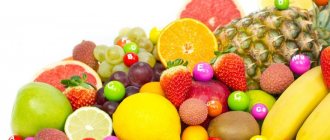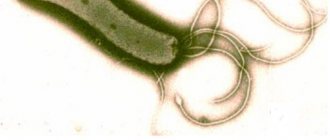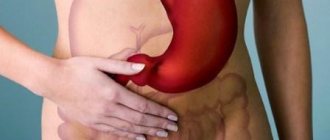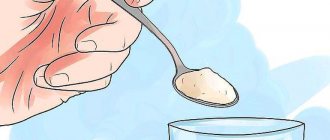Gastritis is a rather dangerous disease, accompanied by various clinical manifestations, which can be in the nature of a general malaise, and also manifest themselves in disturbances in the functioning of the gastrointestinal tract. The use of vitamins for gastritis not only has a potentiating effect on drug therapy, but also stimulates regenerative processes in the body.
A deficiency of biologically active substances leads to chronic diseases, and gastritis can lead to the development of vitamin deficiency.
Signs of vitamin deficiency are fatigue, decreased performance, loss of strength, irritability and nervousness. If the balance of nutrients is not restored, irreversible changes in the body will begin to develop.
A balanced diet is the key to beauty and health, which means it will be easier for the stomach to recover. Vitamins for gastritis play an important role in restoring the functioning of the digestive organs. Therefore, you need to know what vitamins your diseased organ requires and what foods contain them. Additional consumption of synthetic vitamin complexes will not be superfluous. They also increase the body's defenses and promote the regeneration of altered body tissues.
The body's needs for vitamins
The search for an answer to the question of whether it is possible to take vitamins for gastritis leads to paradoxical conclusions. Every day we all need an impressive amount of such “little helpers” that restore body functions and positively affect the functioning of internal organs.
There is always a need for vitamins, but a healthy adult can get them from food.
With gastritis, many foods are prohibited, and during the acute period you cannot eat at all. The immune system puts all its efforts into normalizing the patient's condition, using all its reserves for such purposes. This is how vitamin deficiency begins.
Its symptoms:
- Fast fatiguability;
- Low concentration;
- Nervousness, hot temper;
- Limb spasms;
- Poor appetite;
- Apathy.
With a lack of vitamins for gastritis, recovery is delayed, and the likelihood of side effects increases. The patient has two options - try to replenish reserves by eating foods rich in vitamins or use special pharmacy complexes.
Gastritis and its manifestations
Gastritis is an inflammatory process that results in destructive changes in the epithelial layer of the inner surface of the stomach walls. Due to the fact that the course of the disease is quite long, disruption of the restoration process of tissues that have undergone dystrophic changes leads to partial or complete degradation of the epithelial layer. In other words, the glands responsible for the production of gastric juice die off.
A decrease in the motor and secretory functions of the stomach causes a number of local disorders:
- heaviness in the stomach;
- vomit;
- heartburn;
- pain in the epigastric region
Systematic discomfort in the epigastric region, which is a consequence of disruption of the digestion and absorption of food, is often accompanied by a number of common disorders:
- weakness;
- increased fatigue;
- weight loss;
- arterial hypertension;
- arrhythmia.
What vitamins are required for stomach function?
- Vitamin PP – niacin . The substance normalizes the level of secretion of hydrochloric acid and pepsin. With niacin deficiency, the secretory activity of the stomach is disrupted, causing diarrhea and bloating. Niacin is found in cereals, fish, seafood, and meat.
- Vitamin A regenerates damaged epithelium and increases the body's resistance to infectious influences. Contained in cereals, oils, dairy products.
- Folic acid is a representative of group B and is involved in the process of hematopoiesis and reproductive functions of the body. If the secretory activity of the stomach is insufficient, the absorption of folic acid is reduced. Chronic atrophic gastritis is often accompanied by folate deficiency anemia. Greens, cabbage, animal liver and poultry are rich in folic acid.
- Vitamin B12 – cyanocobalamin. Participates in the processes of cellular respiration and the transfer of oxygen to tissues, in hematopoiesis. With a deficiency, deficiency anemia occurs - a frequent companion to atrophic gastritis. Contained in products of animal origin.
What vitamins are important for gastritis
Vitamins C, PP, or nicotinic acid, B1, B2, A are important in the treatment of gastritis. Vitamin U is especially important for increased acid formation. There is a lot of it in the juice of white cabbage. It normalizes the secretion of hydrochloric acid, and under its action the gastric mucosa heals better.
In order for the vitamins to work and recovery to proceed, you need to eat about 70 g of protein per day. This is a very approximate, average figure. The more you weigh, the more protein you need. 100 g of cottage cheese, meat or fish contains about 20 g of protein, cheese - 25 g, and milk - 3.5 g. When consuming protein, it is better to stick to the golden mean, since excess protein is just as harmful as its deficiency.
Vitamins A and B necessary for the treatment of gastritis
With increased acid formation, vitamin U is especially important. There is a lot of it in white cabbage juice.
Vitamin A is necessary for cell division and normal growth. In addition, vitamin A increases resistance to infections. It is fat-soluble, so it is better absorbed from foods containing fat.
For example, finely grated carrots with vegetable oil are a good source of vitamin A. Nicotinic acid improves blood supply to the stomach and thereby helps relieve inflammation. It contributes to some extent to the formation of gastric juice. B vitamins normalize metabolic processes.
Vitamin A is more resistant to high temperatures. In order to meet the need for this vitamin (1.5 mg per day), you can eat about 30 g of beef liver or 50 g of carrots with vegetable oil, 100 g of dried apricots, 50 g of yolk. Vitamin A is found in dairy products, but in small quantities.
Vitamin C necessary for the treatment of gastritis
Vitamin C has a variety of beneficial effects, for example, it increases the body's resistance to various infections and helps in the healing of erosions (defects in the gastric mucosa), which are often found in gastritis. The daily requirement for vitamin C in humans is 70-80 mg. It is found mainly in fresh vegetables, berries, and fruits. There is a lot of vitamin C in rosehip infusion.
Vitamins B1 B2 PP necessary for the treatment of gastritis
Vitamin B1 is found in meat (turkey, pork) and cereals. Its daily intake is 1.7 mg. This norm can be obtained from 200 g of meat or from 250-300 g of buckwheat, oatmeal, millet cereals or from 200 g of peas.
Vitamin B2 is found mainly in foods of animal origin. The daily norm is 2.2 mg. It is found in 50 g of yolk, in 100 g of beef liver. Vitamin B2 is found in small amounts in meat and cheese. However, if you eat about 200 g of cheese per day, then you get the daily requirement of vitamin B2. Vitamin PP can be obtained from many foods: meat, fish, flour products, cereals, especially buckwheat. In addition, it is produced by the microflora of our intestines.
The role of vitamin deficiency in the development of various types of gastritis
When there is a lack of any vitamin, a disruption occurs in the biochemical metabolic processes that require the participation of this vitamin. Vitamin deficiencies can be divided into two groups.
Vitamin deficiencies, which are the main (direct) cause of gastritis
These include:
- Vitamin C. A lack of vitamin C leads to disruption of the production of collagen, which is the main component of the vascular wall. The consequence of insufficient vascular strength is: pinpoint hemorrhages of the gastric mucosa;
- decreased immune properties of the body.
- atrophy of the epithelial layer of the stomach and its replacement with fibrous tissue;
Vitamin deficiencies, which are an indirect cause of gastritis
Indirect causes of gastritis include vitamin deficiencies, manifested by dysfunction:
- cardiovascular system (B1, B2);
- immune system (C; E);
- nervous system (B1, B12, PP).
For example, the bacterium Helicobacter pylori, which is the main culprit of gastritis, can remain statically in the stomach all its life, until the immune system malfunctions.
Chronic irritability, fatigue, and damage to the nervous system are also indirect culprits in the development of gastritis.
Definition of the concept
Atrophic gastritis is a long-term inflammatory process in the gastric mucosa, leading to a sharp decrease in the number of parietal cells of the stomach, decreased gastric secretion, and impaired absorption of iron and vitamin B12.
Recent studies have found that this pathology is found in more than a third of the entire adult population, but only about 15% of them turn to specialists. People suffering from atrophic gastritis have a very high risk of developing a serious malignant neoplasm - gastric carcinoma.
Atrophy of the gastric mucosa comes down to a significant thinning of the lining and death of the gastric glands that produce gastric juice.
Vitamin deficiency as a consequence of gastritis
In turn, disturbances in the digestive process, due to the development of gastritis, lead to the loss of vitamins and minerals, contributing to the development of anemia. Thus, vitamin deficiency, which occurs due to insufficient vitamin content in food (exogenous vitamin deficiency), causes a decrease in the absorption of vitamins (endogenous vitamin deficiency).
Exogenous vitamin deficiency → gastritis → endogenous vitamin deficiency.
Vitamin B12. Vitamin B12 deficiency (Pernicious anemia) very often occurs due to impaired absorption of vitamin B12 from the gastrointestinal tract. With pernicious anemia, neurological disorders and anemia occur.
The advisability of taking vitamin-mineral complexes
In pharmacy vitamin-mineral complexes, the composition of the drugs is carefully balanced and selected in such a way that the active substances help each other in active absorption. Different drugs have different compositions, so you can select those substances that are necessary for a particular patient in a particular case. One dose of the drug contains the daily norms of vitamins needed by the body, taking into account the fact that some of them will still come from food.
When you take a course of fortification, do not forget about drinking enough and consuming animal and vegetable fat. All vitamins are divided into water-soluble and fat-soluble. If the body does not create an environment for their absorption, then there will be no benefit from taking them.
Every day a person with gastritis needs the following nutrients:
- Vitamins B6, B12;
- Vitamin PP;
- Vitamin A;
- Folic acid.
You can choose vitamin complexes that contain all these components. It is advisable that all medications and dietary supplements be prescribed by a doctor. You should also not overuse vitamins, because this can lead to serious health problems. Excesses of some substances are eliminated by the body on their own, but often they accumulate and cause harm instead of benefit.
What vitamins does a patient with gastritis need?
Before you start giving preference to certain vitamins, you need to know what type of gastritis you have. Vitamins are very useful for our body and for the stomach, in particular, but their daily intake should be normal. Because thoughtless use will not lead to anything good. In this case, you need to consult a gastroenterologist, who, after studying the patient’s medical history and test results, will recommend paying attention to the necessary group of useful elements.
If stomach acidity is increased
For gastritis with high acidity, it is recommended to use the following components that regulate the production of gastric juice and hydrochloric acid:
- Vitamin E normalizes the production of secretory substances in the diseased organ, actively heals damaged gastric mucosa, and helps inhibit the production of hydrochloric acid. This vitamin is rich in vegetable and animal fats, cereals, eggs and dairy products;
- the essential sulfur-containing amino acid methionine neutralizes the increased production of hydrochloric acid in the stomach, has analgesic and healing effects. Methionine is used to treat stomach ulcers and gastritis, in which acidity is increased. Contained in beets, turnips, cabbage and carrots;
- vitamin B5 reduces the concentration of gastric juice and restores the mucous membrane of the affected organ. Helps the body absorb potassium and folic acid. Vitamin B5 is found in seeds, avocado, beef liver, meat, fish;
- Vitamin B12 is especially relevant if the cause of the inflammatory process in the stomach is autoimmune disorders. B12 is found in beef and veal liver, fish and other seafood;
- folic acid or vitamin B9 perfectly relieves inflammation of the gastric mucosa. Green foods are rich in it: spinach, cabbage, broccoli, asparagus, as well as nuts, barley, tuna, salmon;
- Pyridoxine (vitamin B6) reduces the symptoms of gastritis, reduces nausea, and has a sedative effect. The highest content of pyridoxine is in tuna, mackerel, beef liver, buckwheat, chicken breast;
- nicotinic acid normalizes the amount of gastric juice production and relieves diarrhea. Its high content is in yeast, liver, kidneys, and cereals.
If stomach acidity is low
In case of reduced stomach acidity, the use of medications and natural ingredients that increase the acidity of gastric juice is required.
Low acidity is associated with a deficiency in the human body of vitamin B12, a vital element that is synthesized by some bacteria; the absorption of this vitamin is significantly more difficult with gastritis with low acidity.
It is unacceptable to exceed the daily intake of vitamin E; if you take vitamin E separately, it is better to exclude high-fat dairy products, grapes, and flour products containing yeast from your diet, as it will reduce the production of hydrochloric acid.
For gastritis with low acidity, the following vitamins are needed:
- Vitamins A and C normalize the composition of gastric juice, increase immunity, restore the gastric mucosa, strengthen the walls of blood vessels, and serve as excellent antioxidants. These substances are found in carrots, citrus fruits, rose hips, bread, dairy products, bell peppers;
- Vitamin PP balances the acidity of gastric juice.
What vitamins should you take for gastritis with high and low acidity?
Every day a person with gastritis needs the following nutrients:
- vitamins B6, B12;
- vitamin PP;
- vitamin A;
- folic acid.
You can choose vitamin complexes that contain all these components. It is advisable that all medications and dietary supplements be prescribed by a doctor. You should also not overuse vitamins, because this can lead to serious health problems. Excesses of some substances are eliminated by the body on their own, but often they accumulate and cause harm instead of benefit.
You should not treat vitamins as harmless pills. These are the same medications as all others, which have a list of contraindications and possible side effects.
For gastritis with high acidity, in addition to standard vitamin complexes, it is recommended to use vitamin E separately
For gastritis with high acidity, in addition to standard vitamin complexes, it is recommended to use vitamin E separately. It protects the inner walls of the stomach from serious inflammation, lines them, and relieves irritation.
And vitamin C, despite its many advantages and undeniable benefits, should not be used, because it provokes the production of gastric juice. With gastritis with high acidity, this will only add problems.
Gastritis with low acidity indicates that the stomach does not produce enough juice to break down and digest food, so substances that promote the active production of hydrochloric acid are prescribed. Patients are shown vitamins C and PP. In addition to the antiseptic, restorative, healing effect, they help normalize digestive processes and give patients strength to fight the disease.
You can get the required amount of vitamins from food. The problem for patients with gastritis is that they contain prohibited foods - citrus fruits, legumes, cabbage, fresh bread. It is necessary to look for an alternative. Pharmacy vitamin complexes become it. Immediately after you start taking it, you will not feel an immediate positive effect, but over time, your general condition will only improve. Vitamin complexes are selected individually.
Use of fat-soluble vitamins
Taking into account the fact that gastritis has various forms according to etiology (exogenous, endogenous), morphology (erosive, hypertrophic, etc.), functional characteristics (acidity increased, decreased or zero), clinical development (remission, acute form), taking certain taking other vitamins without a doctor’s prescription leads to a relapse of the disease.
Among the fat-soluble ones, the following are usually prescribed:
- Vitamin A , or retinol, is used if gastritis with low acidity is diagnosed. Normalizes the secretory function of the gastric mucosa. Activates the immune system, protects against various infections. Promotes the regenerative function of the gastric epithelial mucosa.
- Vitamin E , or tocopherol, is effective for gastritis with high acidity. The substance neutralizes hydrochloric acid, bringing stomach acidity back to normal. Promotes mucosal regeneration from ulcers and erosive damage. Breaks down free radicals, protecting cells from damaging agents.
- Vitamin K , or phylloquinone, is synthesized in the liver and small intestine. In case of indigestion, it is required to be supplied from the outside, intramuscularly. An active component of the hematopoietic system, involved in blood clotting. Strengthens the walls of blood vessels.
Treatment
Today, the treatment of atrophic gastritis has many “blank spots” and does not guarantee complete success. It includes:
- therapy aimed at eradication (destruction) of Helicobacter. Reduces to prescribing proton pump inhibitors (Pantoprazole, Omeprazole, Lansoprazole) at pH values not lower than 6 and antibacterial agents (Clarithromycin, Amoxicillin, Josamycin, Metronidazole, Levofloxacin).
Eradication therapy is currently considered as one of the methods for preventing the development of gastric cancer;
- prescription of corticosteroids (Prednisolone, Methylprednisolone) in combination of atrophic gastritis with B12-deficiency (pernicious) anemia. In other cases, their side effects will prevail over the benefits. At this stage of medical development, it is not possible to completely eliminate autoimmune mechanisms;
- replacement treatment with natural gastric juice, acedin-pepsin tablets, stomach enzyme preparations (Abomin);
- stimulating therapy with mineral waters (Essentuki 4, 17, Mirgorodskaya, Narzan); rosehip decoction; cabbage, lemon, tomato juices diluted with boiled water; limontar (succinic and citric acids); medicinal mixtures from wormwood, St. John's wort, thyme). Also quite often used is plantaglucide, consisting of granules of plantain leaves;
- prescribing agents that affect the regeneration (restoration) of the gastric mucosa and tissue trophism (Solcoseryl, Venter); gastric motility in case of weakening of its peristalsis and tone, reduction of gastroduodenal reflux and activity of the lower esophageal sphincter (Domperidone, Cerucal, Cisapride);
- enveloping and astringent drugs that have an anti-inflammatory effect (De-nol, etc.).
During the period of remission, treatment of atrophic gastritis of the stomach consists of long-term use of stimulating and replacement therapy.
Water-soluble vitamins
Is it possible to cause complications due to a lack of vitamins in the body?
Without proper treatment under the supervision of a specialist, your health condition can become irreparable. High acidity can lead to stomach ulcers, and low or zero acidity can lead to cancer. But timely use of vitamin complexes will significantly increase the chances of even a complete recovery.
Drink such complexes, but only under the supervision of a doctor, since deficiency and overdose are equally harmful to health.
Among the water-soluble vitamins for gastritis are:
- Vitamin B6 , or pyridoxine, is involved in metabolism, relieves symptoms of nausea, vomiting, nervous and mental disorders. Normalizes the secretory and regenerative functions of the gastric mucosa and the functioning of the nervous system. Present in legumes and grains.
- Vitamin B12 , or folacin, folic acid, works for gastritis with high acidity. Effectively prevents inflammation of the gastric mucosa. Present in foods such as spinach, liver, fish, seafood, cabbage.
- Vitamin PP , or niacin, nicotinic acid, helps normalize the secretory function of hydrochloric acid and the enzyme pepsin. Eliminates diarrhea, nausea, vomiting. Present in cereals, meat, fish, liver and kidneys. Preferable for gastritis with low acidity. In addition, this compound is produced by beneficial bacteria in the small intestine of the human body, but if absorption is impaired, it must be taken orally.
- Vitamin C , or ascorbic acid. The role of this compound is of great importance for the life of the body. It is involved in tissue regeneration, has an antioxidant effect, promotes stress resistance, ensures immune and hematological status, controls redox processes in the body, and affects the permeability of vascular walls. Contained in all citrus fruits, fresh vegetables, berries and fruits.
Video on the topic:
Complex vitamin preparations for gastritis
B vitamins are used for any form of the disease, including gastritis with normal acidity. This group of nutrients has a beneficial effect on the restoration and regeneration of inflamed mucosa. They can be consumed with food, as well as together with vitamin complexes, which can be purchased at any pharmacy. However, you should avoid multivitamins that contain divalent iron, since this element irritates the gastric mucosa and aggravates the course of the disease.
Vitamin-mineral complexes contain a moderate dosage of useful substances that can be taken by patients with gastritis.
To get the maximum effect from the vitamin complex, the drug should be used taking into account certain rules:
- Multivitamins are prescribed only by the attending gastroenterologist, taking into account the patient’s age and the presence of other diseases.
- Before using the drug, you should read the instructions.
- Tablets or capsules should not be chewed or cracked; they should be washed down with plenty of water. Since with increased acidity of the stomach, vitamins are destroyed in an acidic environment, and capsules or whole tablets have a protective shell that does not dissolve quickly in the stomach.
- It is unacceptable to skip taking the drug.
- It is important to take vitamins once every three months for 2-3 weeks, especially in winter and spring, when the human body receives a minimum amount of nutrients.
Aevit
Multivitamin preparation in the form of capsules with oily contents based on vitamins A, E. Characteristics:
- Helps to overcome hypovitaminosis in a short time. The course of therapy lasts two weeks.
- If, as a result of pathology, there is a loss of fat-soluble enzymes, treatment with this drug will be inappropriate, since the components will not be absorbed.
- The active substances are contained in concentrations exceeding the prophylactic concentration. To avoid an overdose, the medicine is taken with caution, under the supervision of a gastroenterologist.
- Used as an addition to main therapy.
- It is prohibited if there are diseases of the kidneys, biliary tract, heart, people predisposed to thrombosis and problems with blood clotting, and pregnant women.
Undevit
The drug is in the form of a pill containing a daily dose of vitamins C, A, P, E, group B. Characteristics:
- prescribed to replenish the body's reserves after various diseases, diets, and the use of antibiotics;
- take one pill twice a day, the duration of treatment is determined individually;
- can be used as a prophylactic agent;
- Contraindications include peptic ulcer, intolerance to the components of the medication, erosive gastritis in the acute stage.
Complivit
A medicine consisting of 11 vitamins and eight minerals that can saturate the body with vital elements. Characteristic:
- prescribed for a lack of vitamins, loss of strength, to maintain the body during illness;
- may not be absorbed during exacerbation of gastritis;
- to treat vitamin deficiency, take 1 tablet twice a day; for preventive purposes, one pill per day is enough;
- suitable for regular use or use in courses;
- Not recommended for sensitive people prone to allergic reactions.
Pharmacy drugs
Patients with gastritis can replenish their daily need for vitamins and microelements with the help of pharmaceutical complexes.
To maximize the effect of taking the complexes, you should take vitamins taking into account the following rules.
- Only the attending physician should prescribe multivitamins, taking into account the patient’s condition, age and diseases.
- You should take the drug as prescribed by your doctor, following the instructions.
- No need to chew tablets or capsules. They are swallowed and washed down with clean water. Vitamin preparations for gastritis with high acidity can be destroyed in an acidic environment, so tablets and capsules have a protective shell that does not dissolve in the stomach.
- It is not advisable to skip taking medication.
- The break between therapeutic courses should last at least 3 months. It is important to take courses of medications in winter and spring, when natural reserves of vitamins are depleted.
Vitamins for the treatment of erosive gastritis
Treatment of gastritis involves following a strict diet. It is combined with mandatory medication intake. Severe restrictions in the diet can lead to a deficiency of components necessary for health. The lack of useful substances and elements contributes to prolongation of the recovery process. Vitamins for gastritis will help speed up the regeneration of the gastrointestinal tract.
Inflammation of the gastric mucosa occurs in the majority of the world's population. The reasons for its occurrence are:
- disrupted diet;
- alcohol;
- presence of Helicobacter pylori and parasites;
- passion for medicines.
Vitamin deficiency is a disease that characterizes a deficiency of essential microelements. It is rarely a catalyst for gastritis symptoms. A lack of nutrients provokes a malfunction of the digestive system. If it leads to illness, it is usually in the form of a main or indirect cause. The first type is characterized by a lack of vitamins A, E, C, K, B2, PP. The second type is a violation of various systems of the human body.
The use of beneficial microelements for inflammation of the gastric mucosa depends on the form of the disease. There are two main types of gastritis: with high acidity and low acidity. The recommendations for each are different. Only a gastroenterologist can tell you exactly what vitamins you should take.
For gastritis with high acidity, it is recommended to take components that regulate the production of gastric juice and hydrochloric acid.
Hyperacid disease requires taking the following elements:
- methionine - neutralizes the secretory activity of the stomach, relieves pain, heals. Used to treat stomach ulcers and gastritis. The content of the substance is high in beets, turnips, carrots, and white cabbage;
- Vitamin E - normalizes the secretory activity of the diseased organ, partially inactivates hydrochloric acid. It has a high healing ability, especially for the gastric mucosa. They are rich in animal and vegetable fats, cereals, eggs, dairy products;
- vitamin B5 - helps reduce the concentration of hydrochloric acid in the affected organ. Helps restore the mucous membrane. Enhances the absorption of potassium and folic acid. The highest content is in beef liver, seeds, avocados, meat, and fish.
Some beneficial substances and components should be avoided at elevated acidity levels. Carriers of chronic diseases are prohibited from consuming fermented milk products, fresh fruits and sour vegetables, and fatty foods.
Vitamins C and A can be taken for gastritis with reduced secretion. In case of increased acidity, postpone until the remission stage arrives. Or, as prescribed by a doctor, take tablets and capsules with a protective coating in synthetic form.
Gastritis with low acidity is characterized by an increase in the time it takes to digest food, its fermentation and decay. Vitamins that contribute to a decrease in secretory function with low acidity are best avoided. This type of inflammation of the gastric mucosa requires following a strict diet and taking medications.
Treatment of the disease, including beneficial microelements and substances, normalizes metabolic processes. Low levels of hydrochloric acid in the stomach require medications and natural ingredients to increase its production.
Interesting fact! Gastritis with reduced secretion can be caused by a lack of vitamin B12 - a vital element synthesized by only a few bacteria and yeast. Progression of the disease leads to problems with its binding.
Some vital microelements can be taken equally by patients with any form of gastritis. You should be careful with vitamin E, which is found mainly in oils - it helps inhibit the excessive production of hydrochloric acid.
Its content in the diet cannot be exceeded, so it is better to exclude fatty dairy products from the diet. You should also avoid products containing yeast, grapes - anything that provokes fermentation in the diseased organ.
For gastritis with low acidity, vitamins are needed:
- Vitamin C - increases the secretion of gastric juice. Is an excellent agent for strengthening the immune system. The systematic use of ascorbic acid helps restore the mucous membrane and strengthen the walls of blood vessels. Rich in the element are rose hips, citrus fruits, and bell peppers;
- Niacin (PP) - regulates the release of digestive enzymes and acid. Balances the acidity of gastric juice. Helps cope with diarrhea (sometimes accompanies symptoms of gastritis). Boletuses (one serving is the daily requirement), cereals, meat, fish are rich in valuable substances;
- Vitamin A - can increase the level of hydrochloric acid in the stomach. Serves as an effective antioxidant and fights infections. It is rich in cereals, oils, bread and other baked goods.
Nutrition for gastritis of any form is strictly regulated. Failure to comply with a therapeutic diet will negate the use of medications. If there is a deficiency of useful elements in the diet, vitamin complexes or synthetic analogues of natural components are prescribed.
There are a number of substances recommended for all types of disease - B vitamins. These include:
- pyridoxine (B6) - reduces the occurrence of some symptoms of gastritis (nausea, irritability). A chronic form of stomach inflammation is often characterized by a deficiency of this vitamin, causing metabolic disorders. Beef, legumes, and cereals are rich in it. Drink B6 for any type of disease to normalize the functioning of the gastrointestinal tract. It is also prescribed for cholecystitis and pancreatic dysfunction;
- folic acid - helps restore inflammatory processes occurring in the stomach. Liver, spinach, and walnuts contain a high dosage of element B9. It is effective for those suffering from many tract diseases (pancreatitis, cholecystitis). The acid is destroyed by heat treatment. Products containing valuable components are best consumed fresh;
- B12 - stabilizes metabolism. A deficiency of the element causes anemia, which disrupts the functioning of the gastrointestinal tract. Beef liver and seafood are rich in the component.
It is important to know! Products containing iron irritate the stomach and its mucous walls. It is worth choosing drugs containing it only after the advice of your doctor.
You can take multivitamin complexes only after consulting a gastroenterologist. They are difficult to digest by a weakened body. The progression of gastritis makes it difficult for some elements to penetrate. In case of inflammation of the stomach, certain substances enhance or weaken the absorption of each other.
For example, the percentage of vitamin B9 intake decreases if the disease has reduced secretion of a chronic form. To replenish it, additional medications containing hydrochloric acid are prescribed.
The information on our website is provided by qualified doctors and is for informational purposes only. Don't self-medicate! Be sure to consult a specialist!
Author: Rumyantsev V. G. Experience 34 years.
Gastroenterologist, professor, doctor of medical sciences. Prescribes diagnostics and carries out treatment. Expert of the group for the study of inflammatory diseases. Author of more than 300 scientific papers.
source
When a person is diagnosed with gastritis, he has to completely change his lifestyle. The first step is to adjust your diet, then give up bad habits. It is very important to monitor what the patient eats; it is necessary to eat gentle food so as not to increase the symptoms of the disease.
A balanced diet is the key to beauty and health, which means it will be easier for the stomach to recover. Vitamins for gastritis play an important role in restoring the functioning of the digestive organs. Therefore, you need to know what vitamins your diseased organ requires and what foods contain them. Additional consumption of synthetic vitamin complexes will not be superfluous. They also increase the body's defenses and promote the regeneration of altered body tissues.
An inflammatory process in the gastric mucosa occurs in most people. The causes of this disease are:
- disrupted diet;
- alcohol abuse;
- the presence of harmful bacteria and parasites;
- taking medications regularly.
In this regard, a person experiences a lack of nutrients; the body does not receive, but only wastes, its vitamin reserves. As a result, biochemical metabolic processes are disrupted, vitamin deficiency develops, nausea, vomiting, psychological disorders occur, and the vulnerability of the gastric mucosa increases.
Lack of which vitamins leads to digestive system disorders:
- Vitamin C. Its deficiency in the body leads to disruption of the productivity of collagen, which is responsible for the elasticity of vascular tissue. As a result of insufficient strength of blood vessels, pinpoint hemorrhages of the gastric mucosa appear and the protective functions of the body are reduced.
- Vitamin K. If the body does not receive enough daily vitamin K, the synthesis of certain proteins in the body is disrupted, and problems with blood clotting arise.
- B vitamins. Erosive lesions of the gastric mucosa occur due to insufficient intake of vitamin B2 into the body. With B12 deficiency, anemia develops, which negatively affects the functioning of the stomach and intestines.
- Vitamin E and niacin . With a deficiency of these substances, the regeneration process slows down, which means erosions that affect the mucous membrane heal very slowly.
- Vitamin A. A lack of this vitamin can cause atrophy of the epithelial layer of the stomach, reducing the production of secretions that help the important organ digest food.
Before you start giving preference to certain vitamins, you need to know what type of gastritis you have. Vitamins are very useful for our body and for the stomach, in particular, but their daily intake should be normal. Because thoughtless use will not lead to anything good. In this case, you need to consult a gastroenterologist, who, after studying the patient’s medical history and test results, will recommend paying attention to the necessary group of useful elements.
For gastritis with high acidity, it is recommended to use the following components that regulate the production of gastric juice and hydrochloric acid:
- Vitamin E normalizes the production of secretory substances in the diseased organ, actively heals damaged gastric mucosa, and helps inhibit the production of hydrochloric acid. This vitamin is rich in vegetable and animal fats, cereals, eggs and dairy products;
- the essential amino acid methionine neutralizes the increased production of hydrochloric acid in the stomach, has analgesic and healing effects. Methionine is used to treat stomach ulcers and gastritis, in which acidity is increased. Contained in beets, turnips, cabbage and carrots;
- vitamin B5 reduces the concentration of gastric juice and restores the mucous membrane of the affected organ. Helps the body absorb potassium and folic acid. Vitamin B5 is found in seeds, avocado, beef liver, meat, fish;
- Vitamin B12 is especially relevant if the cause of the inflammatory process in the stomach is autoimmune disorders. B12 is found in beef and veal liver, fish and other seafood;
- folic acid or vitamin B9 perfectly relieves inflammation of the gastric mucosa. Green foods are rich in it: spinach, cabbage, broccoli, asparagus, as well as nuts, barley, tuna, salmon;
- Pyridoxine (vitamin B6) reduces the symptoms of gastritis, reduces nausea, and has a sedative effect. The highest content of pyridoxine is in tuna, mackerel, beef liver, buckwheat, chicken breast;
- nicotinic acid normalizes the amount of gastric juice production and relieves diarrhea. Its high content is in yeast, liver, kidneys, and cereals.
In case of reduced stomach acidity, the use of medications and natural ingredients that increase the acidity of gastric juice is required.
Low acidity is associated with a deficiency in the human body of vitamin B12, a vital element that is synthesized by some bacteria; the absorption of this vitamin is significantly more difficult with gastritis with low acidity.
It is unacceptable to exceed the daily intake of vitamin E; if you take vitamin E separately, it is better to exclude high-fat dairy products, grapes, and flour products containing yeast from your diet, as it will reduce the production of hydrochloric acid.
For gastritis with low acidity, the following vitamins are needed:
- Vitamins A and C normalize the composition of gastric juice, increase immunity, restore the gastric mucosa, strengthen the walls of blood vessels, and serve as excellent antioxidants. These substances are found in carrots, citrus fruits, rose hips, bread, dairy products, bell peppers;
- Vitamin PP balances the acidity of gastric juice.
B vitamins are used for any form of the disease, including gastritis with normal acidity. This group of nutrients has a beneficial effect on the restoration and regeneration of inflamed mucosa. They can be consumed with food, as well as together with vitamin complexes, which can be purchased at any pharmacy. However, you should avoid multivitamins that contain divalent iron, since this element irritates the gastric mucosa and aggravates the course of the disease.
Vitamin-mineral complexes contain a moderate dosage of useful substances that can be taken by patients with gastritis.
To get the maximum effect from the vitamin complex, the drug should be used taking into account certain rules:
- Multivitamins are prescribed only by the attending gastroenterologist, taking into account the patient’s age and the presence of other diseases.
- Before using the drug, you should read the instructions.
- Tablets or capsules should not be chewed or cracked; they should be washed down with plenty of water. Since with increased acidity of the stomach, vitamins are destroyed in an acidic environment, and capsules or whole tablets have a protective shell that does not dissolve quickly in the stomach.
- It is unacceptable to skip taking the drug.
- It is important to take vitamins once every three months for 2-3 weeks, especially in winter and spring, when the human body receives a minimum amount of nutrients.
Ascorbic acid plays a significant role in gastritis and in the metabolic processes of the body. It increases the defenses, which means it favors the recovery of patients with gastritis. In people who smoke and those exposed to passive smoking, the consumption of ascorbic acid increases significantly, which means the daily requirement should be higher than normal - 150-200 mg.
For chronic atrophic gastritis, vitamin C is allowed to be consumed in the form of a pharmaceutical preparation. Drink vitamin C after meals, wash it down with clean water, but not tea or other drinks.
Vitamin C is found in rose hips, sea buckthorn, greens, citrus fruits, red fruits, cauliflower, green peas, and beans. However, not all products are allowed for a certain form of gastritis. Therefore, the use of each product should be coordinated with your doctor.
Compliance with the rules for the use of useful substances for gastritis gives a positive result in the complex treatment of a serious stomach disease. Vitamins will become real helpers for any form of gastritis when it is necessary to follow a diet. During this period, the body does not receive enough nutrients. And in order to increase the body’s protective functions, it needs beneficial substances that are found in certain foods or pharmaceuticals.
source
Medicines for erosive gastritis of the stomach help relieve the symptoms of the disease and improve the condition of the mucous membrane. Diseases of the gastrointestinal tract should be taken seriously - medical care and treatment should not be ignored. Inflammation of the gastric mucosa can result in the development of ulcers and pancreatitis, so the prescription of drug treatment for erosive gastritis is especially important in the fight against the disease.
Before starting therapy, it is necessary to identify the type of disease. There are several forms and types of the disease:
- Spicy. The development of inflammation occurs very quickly over the entire surface of the gastric walls.
- Hemorrhagic. The inflammatory process becomes chronic.
- Erythematous gastritis. It develops in the antral region of the organ - where the duodenum begins.
- Reflux gastritis. It is characterized by the reflux of gastric juice into the esophagus, which causes erosion on the mucous membrane.
Among stomach diseases, the most common is the chronic form. Medicines for the stomach and intestines for erosive gastritis are prescribed by a doctor after examination, medical history and diagnosis. Their purpose depends on the characteristics of the diagnosis and the age of the patient.
The bacterium Helicobacter causes erosive inflammation of the mucous membrane of the digestive organ. Single or multiple erosions are formed on the surface of the mucous membrane under the influence of pathogenic flora. Hemorrhagic damage to the stomach tissue develops. In the acute form, the symptoms are more pronounced and cause severe discomfort to the patient.
There are several reasons that caused the defeat. Factors that cause gastritis include:
- constant use of medications;
- alcoholism;
- smoking;
- lack of hygiene;
- poor nutrition;
- Constantly eating food that is too cold.
In some cases, gastritis can develop as a secondary disease due to diabetes, Crohn's disease, or hormonal problems. With this type of gastritis, the pH of the stomach acidity is disrupted. You should pay attention to the symptoms of the abdomen before treating erosive gastritis of the stomach, the gastroenterologist will prescribe.
The disease can masquerade as a food infection. But in this case, the symptoms are associated with gastric erosion; drugs for the treatment of erosive gastritis of the stomach can relieve the inflammatory process and prevent ulcers.
Characteristic signs of the disease:
- nausea;
- heartburn;
- bowel disorders;
- bloating;
- mild pain in the stomach.
In some situations, vomiting with blood streaks and the development of bleeding followed by a state of shock are possible. Complications include the appearance of ulcers.
At an appointment with a gastroenterologist, the patient undergoes a medical examination. The following are prescribed as diagnostics:
- blood tests;
- pH-metry to detect acidity;
- gastroscopy;
- biopsy.
Using probing, gastric secretions are examined. For this purpose, additional instruments are built into the gastroscope that determine the level of gastrin.
If affected by bacteria, stool analysis and certain tests are prescribed. X-ray examination of the gastrointestinal tract also occupies a special place in the diagnosis of gastritis.
The erosive form of the disease requires taking certain medications, maintaining a healthy lifestyle and following a therapeutic diet. Treatment of erosive gastritis with medications and dosage regimen is prescribed by a gastroenterologist.
In complex therapy, medications are used whose action is aimed at relieving inflammation, stabilizing organ functions, and healing erosion. It is important to follow the dosage specifications for gastritis and medical recommendations.
Antibacterial drugs are used to destroy pathogenic bacteria that cause disease. Three-component drug regimens are prescribed, which include a combination of an antibiotic and Trichopolum.
Most often prescribed:
- Tetracycline;
- Clarithromycin;
- Levofloxacin;
- Amoxicillin.
Antibiotic therapy eliminates the inflammatory process and inhibits the development of the disease, preventing organ ulcers and other complications. For severe pain, painkillers are prescribed.
Prescribing medications that regulate gastrointestinal motility helps prevent aggressive gastric juice from refluxing into the esophagus. To increase the tone of the organic walls, the treatment regimen for erosive gastritis is carried out with medications that affect the functioning of nerve endings.
To enhance the protection of the mucous membrane, medications are prescribed for erosive gastritis - list of tablets:
The products improve the functions of the beneficial microflora of the stomach and local immunity, and promote rapid recovery.
Antacids neutralize the effect of hydrochloric acid in the stomach and avoid severe irritation of the mucous membrane. As a result, heartburn, nausea and pain stop, and heaviness in the stomach disappears.
For this purpose the following are used:
Only a doctor who understands the mechanisms of symptoms and knows all the features of the disease prescribes medications.
De-nol, Mezim and Sucralfate products help improve the digestive process and avoid dyspeptic disorders. The drugs increase blood supply to the stomach and intestines and form a protective layer on the mucous membrane.
The medicine can be taken 2 times a day, 1 tablet. Also, to improve digestion, enzyme preparations can be taken 1/2 tablet 4 times a day.
The regulation of gastric secretion is of great importance in the treatment of the disease. Increased pepsin activity provokes irritation of the mucous membrane and a decrease in the production of the main component of gastric mucus - mucin. Increased pepsin activity has an extremely negative effect on the condition of the gastric walls and causes erosion.
To avoid this, M-cholinergic blockers are used - Pirenzepine, Gastrocepin, Metacin, Platiphylline. Medicines affect secretion and stabilize gastric contractions. Ganglioblockers, synthetic prostaglandins, and H2-histamine blockers also have an antisecretory effect. The drugs eliminate increased stimulation of the stomach and intestines and reduce the secretion of pepsin. As a result, nausea and vomiting disappear, and abdominal pain decreases.
To correct acidity, proton pump inhibitors are prescribed - Omez, Nolpaza, Omeprozole. The drug Omez has an effective effect. It protects gastric structures from the negative effects of hydrochloric acid. Take the drug for about 2 weeks, one capsule before meals.
The duration of therapy largely depends on the rate of regeneration of the affected organ tissues. Restoration of the mucous membrane is provided by the drugs Akgovegin, Karbenokosol, Biogastron. The action of the drugs is aimed at enhancing the regeneration of affected cells and eliminating erosion.
The process of restoring the mucous membrane and providing it with the necessary protection is quite long. Treatment of erosion may take several months.
Important! Even if the drug seems safe, you should not self-medicate or take it without consulting your doctor.
Pain during erosion of the gastric walls can be mild. However, for severe pain, doctors recommend taking painkillers. Analgesics and antispasmodics will help relieve stomach pain. How can you cure erosive gastritis? Your doctor will tell you.
To eliminate pain the following are prescribed:
You can purchase plant-based antispasmodics at the pharmacy, which include extracts of lily of the valley, tansy, oregano and other medicinal herbs. There is nothing dangerous in treating erosive gastritis with herbal medicines.
The main prevention of exacerbation of gastritis is a therapeutic diet.
- It is important not to eat fried and spicy foods when you are ill, and to exclude irritating spices, coffee, strong black tea, and soda from your diet. The use of marinades, pickles, smoked and sausage products is prohibited.
- It is recommended to boil or steam dishes. Instead of frying, meatballs and cutlets are steamed. The menu should include porridges made from oatmeal, buckwheat, millet, and semolina. You need to eat often, the food should be warm, not cold.
- To prevent illness, you should not overeat and overload the organic cavity during feasts. Meals should be moderate and fractional - the entire amount of food is eaten in small portions 5-6 times a day. This measure prevents the development of erosion and digestive disorders.
- To improve well-being and strengthen the immune system, the use of folk recipes is allowed. Taking infusions and decoctions of chamomile, angelica, rose hips, and plantain helps improve the condition of the digestive system.
- Of particular importance in preventing the disease is a healthy lifestyle and avoidance of alcohol and smoking. Alcohol and nicotine compounds poison the mucous membrane of the stomach and the entire digestive tract. Smoking and alcohol affect the digestive and other internal organs. Some of the nicotine tars enter the cavity along with saliva and have a direct negative effect on organic tissues. To avoid the development of gastritis, it is necessary to completely avoid cigarettes and alcohol consumption.
- Sports, fitness, and yoga will help improve blood supply to the digestive tract. If sports are not acceptable, simple frequent walks in the park are sufficient. Walking, running, various bends, squats and other elements of health-improving gymnastics improve blood microcirculation in the pelvic organs and promote good digestion. Moderate physical activity has a beneficial effect on the condition of the gastrointestinal tract.
It is always easier to prevent a disease than to recover from it. Chronic and acute gastritis requires the use of various groups of medications. Complex therapy helps eliminate the disease, but fighting it will require a lot of effort and time.
source
A deficiency of biologically active substances leads to chronic diseases, and gastritis can lead to the development of vitamin deficiency.
Signs of vitamin deficiency are fatigue, decreased performance, loss of strength, irritability and nervousness. If the balance of nutrients is not restored, irreversible changes in the body will begin to develop.
A necessary condition for the treatment of chronic gastritis is strict adherence to the diet. The patient's diet during an exacerbation is limited. This leads to insufficient intake of microelements. You need to know what vitamins to take for gastritis.
Often with chronic gastritis, deficiency of vitamin B6 – pyridoxine – develops. Hypovitaminosis B6 disrupts nerve conduction. Also, with a deficiency of the substance, the gastric mucosa is susceptible to aggressive external influences.
- Vitamin PP – niacin. The substance normalizes the level of secretion of hydrochloric acid and pepsin. With niacin deficiency, the secretory activity of the stomach is disrupted, causing diarrhea and bloating. Niacin is found in cereals, fish, seafood, and meat.
- Vitamin A regenerates damaged epithelium and increases the body's resistance to infectious influences. Contained in cereals, oils, dairy products.
- Folic acid is a representative of group B and is involved in the process of hematopoiesis and reproductive functions of the body. If the secretory activity of the stomach is insufficient, the absorption of folic acid is reduced. Chronic atrophic gastritis is often accompanied by folate deficiency anemia. Greens, cabbage, animal liver and poultry are rich in folic acid.
- Vitamin B12 – cyanocobalamin. Participates in the processes of cellular respiration and the transfer of oxygen to tissues, in hematopoiesis. With a deficiency, deficiency anemia occurs - a frequent companion to atrophic gastritis. Contained in products of animal origin.
Ascorbic acid is an important component of metabolism. Participates in redox processes in the body. In smokers and people exposed to passive smoking, the consumption of ascorbic acid in the body increases, which entails a higher daily requirement.
Ascorbic acid, together with retinol and tocopherol, is a natural antioxidant. Since with gastritis the list of products is limited, a deficiency of the substance occurs in the body.
For chronic atrophic gastritis, vitamin C can be taken in the form of a preparation. It is better to drink ascorbic acid tablets after meals, washed down with clean water, but not tea or other drinks.
The vitamin is found in rose hips, currants, sea buckthorn, greens, and citrus fruits. But not all products are allowed for gastritis, especially in the acute phase.
Vitamin E or tocopherol is a fat-soluble component that is rich in vegetable oils, river and sea fish.
Tocopherol belongs to the group of antioxidants and is able to restore the structure of the cell wall damaged by aggressive factors. It also inactivates free radicals formed as a result of peroxidation, protecting cells from damage. Vitamin E for gastritis has high regenerative activity: the component heals ulcers and erosions of the gastric mucosa.
Since gastritis limits the consumption of fats, access to the body through food is limited: the substance is taken in the form of a drug. The dosage and duration of the treatment course is determined by the attending physician.
Vitamin B9 or folic acid is a water-soluble substance from group B that plays a role in hematopoiesis, reproductive function in women, and in restoring the body's immunity. Since chronic gastritis causes a violation of the absorption of folic acid in the stomach, there is a need to take medications.
Folic acid is obtained through food, eating bread, legumes, leafy greens, and honey. During heat treatment of products, a significant part of the substance is destroyed. It is preferable to eat greens fresh.
Gastritis, which is accompanied by increased secretory activity of the stomach and excessive production of hydrochloric acid, requires increased doses of the following vitamins.
Pyridoxine promotes normal nerve conduction. With a deficiency, skin sensitivity disorders, astheno-neurotic disorders, and neurosis-like syndromes are noted. Contained in cereals and legumes.
The metabolic component belongs to the water-soluble group and is found in fish, seafood, and beef liver. Participates in hematopoiesis. Normalizes the mechanisms of neuromuscular transmission. Vitamin deficiency leads to the development of serious autoimmune processes in the body, as well as severe B12 deficiency anemia.
For gastritis with high acidity, the substance fights inflammation of the gastric mucosa.
Vitamin E for hyperacid gastritis partially inactivates hydrochloric acid and normalizes the acidity of gastric juice. The vitamin also has reparative abilities.
Vitamin PP controls the secretion of hydrochloric acid and digestive enzymes in the stomach. Thanks to this, the acidity level of gastric juice is normalized. Also effective for diarrhea.
Increases local immunity and protects against exposure to infectious agents. It has a pronounced antioxidant and wound-healing effect.
Ascorbic acid stimulates the body's immune defense.
The component strengthens the walls of capillaries, makes them elastic, prevents gastric bleeding and the development of erosive processes.
The vitamin is synthesized in the liver. It is practically not found in food products. It is an important part of the blood coagulation system.
Patients with gastritis can replenish their daily need for vitamins and microelements with the help of pharmaceutical complexes.
To maximize the effect of taking the complexes, you should take vitamins taking into account the following rules.
- Only the attending physician should prescribe multivitamins, taking into account the patient’s condition, age and diseases.
- You should take the drug as prescribed by your doctor, following the instructions.
- No need to chew tablets or capsules. They are swallowed and washed down with clean water. Vitamin preparations for gastritis with high acidity can be destroyed in an acidic environment, so tablets and capsules have a protective shell that does not dissolve in the stomach.
- It is not advisable to skip taking medication.
- The break between therapeutic courses should last at least 3 months. It is important to take courses of medications in winter and spring, when natural reserves of vitamins are depleted.
If you follow the rules, vitamins will provide tremendous assistance in the treatment of chronic gastritis and related diseases.
Taking vitamin complexes will also help avoid a number of chronic diseases and increase the body's immune defense.
- Vitamins for pancreatitis
- Sea buckthorn oil for gastritis
- Mushrooms for gastritis
- Onions for gastritis
Vitamin C (ascorbic acid) is contraindicated for gastritis with high acidity, because stimulates the secretion of gastric juice.
That's right Vladislav! Vitamin C just breaks your stomach. Vitamin C is the worst enemy of a sick stomach.
source
Use of ascorbic acid for gastritis
Ascorbic acid plays a significant role in gastritis and in the metabolic processes of the body. It increases the defenses, which means it favors the recovery of patients with gastritis. In people who smoke and those exposed to passive smoking, the consumption of ascorbic acid increases significantly, which means the daily requirement should be higher than normal - 150-200 mg.
For chronic atrophic gastritis, vitamin C is allowed to be consumed in the form of a pharmaceutical preparation. Drink vitamin C after meals, wash it down with clean water, but not tea or other drinks.
Vitamin C is contraindicated for gastritis with high acidity
Vitamin C is found in rose hips, sea buckthorn, greens, citrus fruits, red fruits, cauliflower, green peas, and beans. However, not all products are allowed for a certain form of gastritis. Therefore, the use of each product should be coordinated with your doctor.
Compliance with the rules for the use of useful substances for gastritis gives a positive result in the complex treatment of a serious stomach disease. Vitamins will become real helpers for any form of gastritis when it is necessary to follow a diet. During this period, the body does not receive enough nutrients. And in order to increase the body’s protective functions, it needs beneficial substances that are found in certain foods or pharmaceuticals.
Causes of atrophic gastritis
Atrophic gastritis is a multifactorial condition. There is no single cause leading to this disease. More than a dozen factors play a role in the formation of functional gastric insufficiency. Among them:
- genetic predisposition;
- age-related changes in the gastric mucosa;
- diseases of the thyroid gland, for example, myxedema, manifested by insufficiency of its function;
- disturbance of nervous regulation;
- insufficient blood supply to the gastric walls (for example, with anemia of various etiologies);
- long-term use of certain medications (hormonal and others);
- alcoholism;
- smoking;
- occupational hazards (long-term inhalation of coal, metal, cotton dust);
- lack of nutritional culture - addiction to smoked, spicy food.
The two most important causes of the development of atrophic gastritis are autoimmune mechanisms and Helicobacter pylori infection.
How to take vitamins correctly
There are certain rules for taking multivitamin complexes that should be taken into account when purchasing medications.
Now you need to decide what vitamins you can take for gastritis? Vitamin complexes, which should not contain iron and its derivatives. In any form of gastritis, this trace element will irritate the already damaged gastric mucosa, aggravating the symptoms of gastritis.
It is very important to consider the compatibility of vitamins with each other. Retinol should not be taken with B12 and K. Pyridoxine will not work if taken together with B12. Folic acid does not work with retinol, B6, C, E. Ascorbic acid cannot work in the presence of B12. Vitamin E will not be absorbed if taken with B12 and K.
The latter does not work in the presence of vitamins A and E.
If you have gastritis, you need to take vitamins in their entirety. It is better not to chew them and wash them down with a small amount of water. Why should you do this? The acidic environment of the stomach destroys vitamins. They will not work and will not reach the desired location in the body. Typically, vitamins in the form of tablets or dragees come with a special protective shell, which allows the substance in the stomach to “get” to its site of action and begin to work.
When selecting vitamin complexes, a mandatory consultation with a specialist is required, who will help determine not only the optimal vitamin set, but also create a suitable diet, prescribe the necessary groups of drugs without harm to health and taking into account all medical research. Special vitamin therapy usually lasts 30 days, then a break is taken for 3-4 months. Then vitamin therapy is repeated.
What can you eat with atrophic gastritis?
Each patient suffering from atrophic gastritis must adhere to the following nutritional principles:
- food should be soft or semi-liquid, puree (in this form it is better absorbed);
- Between the main three meals you need to introduce two snacks (to stimulate the production of hydrochloric acid);
- food should not be very cold or too hot (to avoid additional injury to the gastric mucosa);
- the break between meals should not exceed 4 hours;
- serving size should be about 200 grams;
- be sure to give up smoking and alcohol (even small portions of alcoholic beverages can negate all treatment);
- Avoid foods that are too fatty and spicy.
The diet for atrophic gastritis should be maintained for life.
Products approved for use:
- low-fat varieties of fish (hake, cod) and meat (chicken, rabbit, nutria);
- eggs;
- rice, oatmeal, buckwheat porridge;
- mineral water;
- berry and fruit jelly, compotes, weak tea;
- lactic acid products (cottage cheese, kefir);
- potato;
- honey.
Half an hour before meals, it is recommended to use a decoction of rose hips, St. John's wort, wormwood or plantain.











